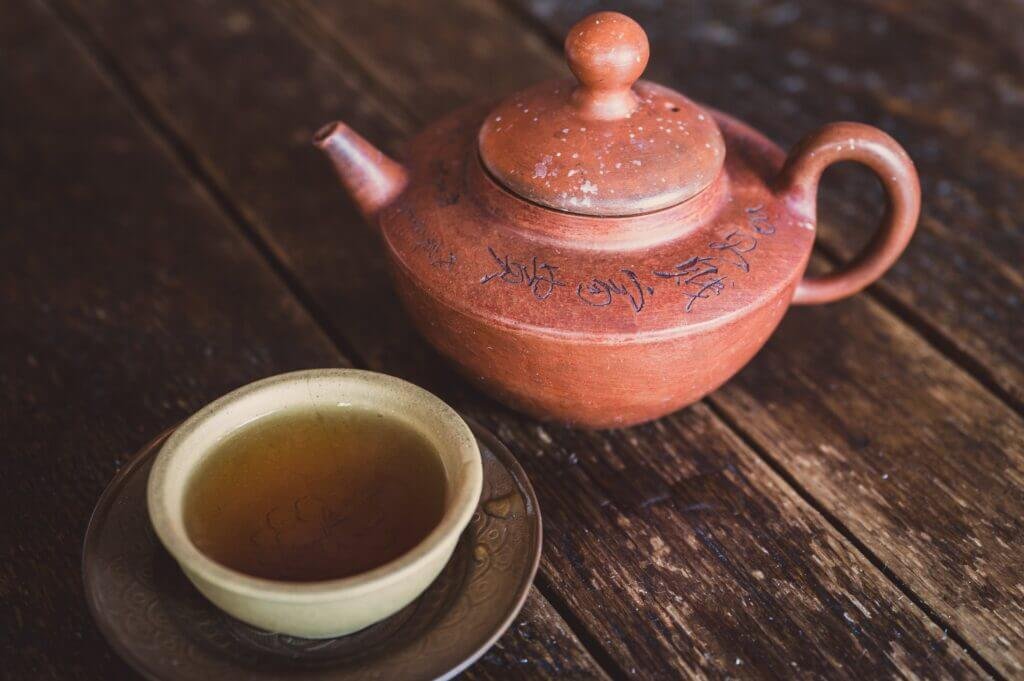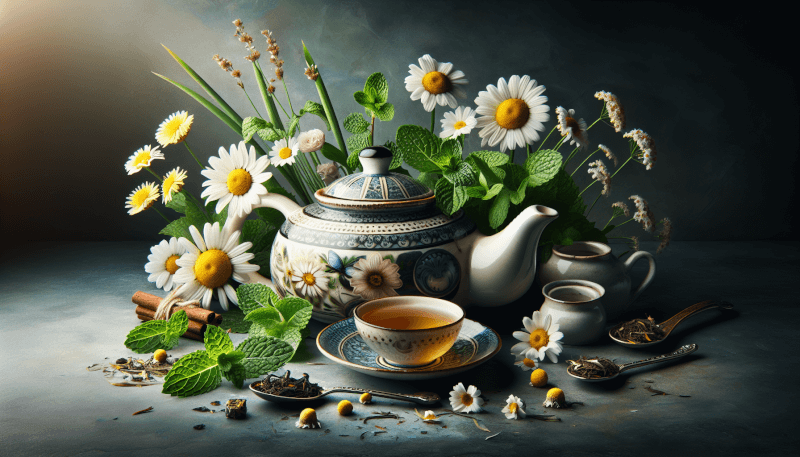If you’re a tea lover but find yourself avoiding it due to caffeine, worry no more! This article is dedicated to exploring the realm of caffeine-free specialty tea options. Whether you’re looking for a calming herbal blend, a refreshing fruit infusion, or a unique and exotic flavor, there is a tea out there for every taste and dietary preference. Discover the wide world of caffeine-free specialty teas and indulge in a delicious and soothing experience without the jitters.

Overview of Caffeine-Free Specialty Tea Options
If you’re someone who loves drinking tea but prefers to avoid caffeine, you’ll be pleased to know that there are a variety of caffeine-free specialty tea options available. Whether you’re looking for herbal infusions, decaffeinated teas, or unique flavors like Rooibos, Honeybush, Chamomile, Peppermint, Lemongrass, or Ginger, there’s a caffeine-free tea out there to suit your taste buds and provide you with a delightful tea-drinking experience. In this article, we’ll explore the world of caffeine-free specialty teas and discover the different options and benefits they offer.
What are specialty teas?
Specialty teas refer to teas that are made from specific plants or herbs and offer unique flavors, health benefits, or cultural significance. These teas often have distinctive characteristics that set them apart from traditional teas. Specialty teas can be a great alternative for tea enthusiasts who want to try something different or expand their tea-drinking horizons.
Understanding caffeine content in tea
Before we dive into the caffeine-free specialty tea options, it’s important to understand the caffeine content in tea. Generally, tea leaves naturally contain caffeine. However, the caffeine content can vary depending on factors such as the type of tea, the growing conditions, and the processing methods. While some teas like black tea and green tea are known for their higher caffeine levels, other teas can be naturally caffeine-free or undergo a decaffeination process to remove the caffeine.
Herbal Infusions
Definition and characteristics
Herbal infusions, often referred to as herbal teas, are caffeine-free beverages made by steeping various plants, herbs, flowers, or fruits in hot water. Unlike true tea made from the Camellia sinensis plant, herbal infusions do not contain tea leaves and are therefore naturally free of caffeine. They are a popular choice for those looking for a soothing and caffeine-free beverage option.
Popular caffeine-free herbal infusions
Some popular herbal infusions include:
Chamomile: Made from the flowers of the chamomile plant, chamomile tea is known for its calming properties and delicate floral flavor. It is often enjoyed before bedtime to promote relaxation and a restful sleep.
Peppermint: Peppermint tea is made from the leaves of the peppermint plant and is well-loved for its refreshing and invigorating flavor. It is known to aid digestion and provide relief from stomach discomfort.
Lemongrass: Lemongrass tea is made from the leaves of the lemongrass plant and has a citrusy and aromatic flavor. It is often consumed for its calming properties and potential health benefits.
These are just a few examples of the wide variety of caffeine-free herbal infusions available. Each herbal infusion offers its own unique taste profile and potential health benefits.

Decaffeinated Tea
How is tea decaffeinated?
Decaffeinated tea is a popular choice for those who still want to enjoy the flavor and experience of traditional teas but without the stimulating effects of caffeine. There are different methods used to decaffeinate tea, but the most common ones include:
Chemical solvent method: This method involves using solvents such as ethyl acetate or methylene chloride to extract caffeine from the tea leaves. The tea leaves are soaked in the solvent, which selectively removes the caffeine while retaining the flavor compounds.
Carbon dioxide method: In this method, carbon dioxide is used to extract caffeine from the tea leaves at high pressures. The carbon dioxide is then evaporated, leaving behind decaffeinated tea leaves.
Types of decaffeinated tea
Decaffeinated tea is available in various forms, including:
Decaffeinated black tea: Black tea, which is typically higher in caffeine, can also be enjoyed in a decaffeinated form. It provides a robust and full-bodied flavor without the caffeine content.
Decaffeinated green tea: Green tea, known for its health benefits, can also be decaffeinated. Decaffeinated green tea still retains the characteristic grassy and vegetal flavors of traditional green tea.
Benefits and drawbacks of decaffeinated tea
Decaffeinated tea offers several benefits for those who want to limit their caffeine intake. It allows tea lovers to enjoy their favorite teas without the stimulating effects of caffeine. Decaffeinated teas can also be a suitable option for those with sensitivity to caffeine or who need to avoid it due to certain health conditions.
However, it’s important to note that the decaffeination process may slightly alter the flavor and aroma of the tea. Some tea enthusiasts may notice a subtle difference in taste compared to their caffeinated counterparts. Additionally, it’s worth mentioning that decaffeinated teas are not completely caffeine-free. While the caffeine content is significantly reduced, trace amounts may still be present.
Rooibos Tea
Introduction to Rooibos tea
Rooibos tea, also known as red bush tea, is a caffeine-free herbal tea that originates from South Africa. It is made from the leaves of the Aspalathus linearis plant, a shrub native to the Cederberg region. Rooibos tea has gained popularity around the world for its sweet and nutty flavor, as well as its potential health benefits.
Health benefits of Rooibos
Rooibos tea is known for its antioxidant properties, which can help protect the body against free radicals. It is rich in polyphenols and flavonoids, which are beneficial compounds that support overall health. Additionally, Rooibos tea is believed to have anti-inflammatory properties and may be helpful in relieving certain skin conditions or allergies.
Flavor profiles and varieties
Rooibos tea has a naturally sweet and nutty flavor, which is often described as smooth and mellow. It does not have the bitterness or astringency commonly found in traditional teas. Rooibos tea can be enjoyed plain or with added ingredients like honey or lemon for a delightful twist. There are also various flavored Rooibos teas available, such as vanilla, caramel, or fruit-infused varieties, which offer a wide range of taste experiences.

Honeybush Tea
Exploring Honeybush tea
Honeybush tea, like Rooibos tea, is a caffeine-free herbal tea native to South Africa. It is made from the Cyclopia plant, which is part of the legume family. Honeybush tea got its name from the sweet scent it exudes when brewed, reminiscent of honey.
Potential health benefits
Similar to Rooibos tea, Honeybush tea is rich in antioxidants and has anti-inflammatory properties. It may support immune health, aid digestion, and promote relaxation. It is also a source of various minerals and contains no calories or caffeine.
Different blends and flavors
Honeybush tea is available in a variety of blends and flavors to suit different tastes. Some popular variations include plain Honeybush, Honeybush with vanilla, or fruit-infused options. The flavors of Honeybush tea range from sweet and floral to warm and earthy, offering a delightful drinking experience for everyone.
Chamomile Tea
Understanding Chamomile tea
Chamomile tea is a caffeine-free herbal tea made from the flowers of the chamomile plant. It has been used for centuries as a traditional remedy for various ailments and is widely known for its soothing properties.
Health benefits and uses
Chamomile tea is often consumed for its calming effects and is known to promote relaxation and reduce anxiety. It may also help with sleeplessness and promote a restful sleep. Chamomile tea has anti-inflammatory properties and may be beneficial for digestive issues, menstrual cramps, and skin conditions.
Flavor and aroma characteristics
Chamomile tea has a delicate floral flavor with hints of apple and a slightly sweet taste. It has a gentle aroma that is often described as calming and comforting. The mild and pleasant taste of chamomile tea makes it a popular choice for those looking to unwind and enjoy a soothing cup of tea.
Peppermint Tea
Introduction to Peppermint tea
Peppermint tea is a refreshing and invigorating herbal tea made from the leaves of the peppermint plant. It is widely consumed for its cooling properties and distinct taste.
Medicinal properties and health benefits
Peppermint tea has been used for centuries to aid digestion and relieve stomach discomfort. It can help alleviate symptoms of indigestion, bloating, and nausea. Peppermint tea is also known for its menthol content, which may provide relief from congestion and soothe sore throats.
Taste and fragrance profiles
Peppermint tea has a strong and invigorating flavor with a cooling sensation. It has a distinct minty taste that is both refreshing and soothing. The aroma of peppermint tea is fresh and minty, making it a popular choice for those seeking a revitalizing tea experience.
Lemongrass Tea
Exploring Lemongrass tea
Lemongrass tea is a caffeine-free herbal tea made from the leaves of the lemongrass plant. It is known for its citrusy flavor and aromatic qualities, making it a popular choice for tea enthusiasts.
Wellness advantages and applications
Lemongrass tea is often consumed for its potential health benefits. It is believed to support digestion, relieve anxiety and stress, and promote overall well-being. Lemongrass tea is also known for its antimicrobial properties and may help boost the immune system.
Aromas and flavors
Lemongrass tea has a distinct citrusy flavor with hints of lemon and a mild sweetness. It has a refreshing and uplifting aroma, reminiscent of lemon zest. Lemongrass tea can be enjoyed hot or cold and is a wonderful beverage choice for those seeking a vibrant and zesty tea experience.
Ginger Tea
Understanding Ginger tea
Ginger tea is a caffeine-free herbal tea made from the root of the ginger plant. It has been used in traditional medicine for centuries and is known for its spicy and pungent flavor.
Health benefits and uses
Ginger tea is revered for its numerous health benefits. It is known to aid digestion, reduce nausea and vomiting, and relieve respiratory symptoms. Ginger tea may also have anti-inflammatory properties and help alleviate menstrual cramps.
Spicy and pungent flavor profiles
Ginger tea has a strong and fiery flavor with a warming sensation. It delivers a spicy and pungent taste that can be quite invigorating. The aroma of ginger tea is intense and distinctive, characterized by its spicy and earthy notes. Ginger tea is a fantastic choice for those who appreciate a bold and stimulating tea experience.
Conclusion
Choosing the right caffeine-free specialty tea for you can be an exciting journey. With a wide range of options available, from herbal infusions to decaffeinated teas and unique flavors like Rooibos, Honeybush, Chamomile, Peppermint, Lemongrass, and Ginger, there is a tea out there to suit every palate. Whether you’re looking for relaxation, potential health benefits, or simply a change from traditional teas, the expanding world of caffeine-free options offers something for everyone. So sit back, brew a cup of your favorite caffeine-free specialty tea, and embark on a flavorful and soothing tea-drinking adventure. Cheers to good health and delightful sips!


